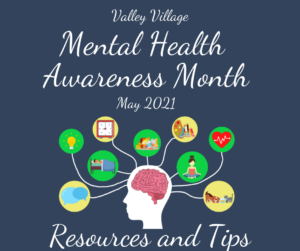 May is Mental Health Awareness Month, and the purpose is to raise awareness of mental health and mental illness. For example, approximately 18.1% of Americans suffer from depression, schizophrenia, and bipolar disorder. It’s increasingly important to understand the realities of living with these conditions and strategies for attaining mental health and wellness.
May is Mental Health Awareness Month, and the purpose is to raise awareness of mental health and mental illness. For example, approximately 18.1% of Americans suffer from depression, schizophrenia, and bipolar disorder. It’s increasingly important to understand the realities of living with these conditions and strategies for attaining mental health and wellness.
Valley Village programs take a person-centered approach to support the whole individual, including physical and mental well-being. Each individual participates in setting goals, working with caregiver support to achieve goals, and to live independently as possible. Learn more about Valley Village programs at valleyvillage.org
Below are some tips and activities to help maintain or improve your overall mental well-being. These tips, activities, and more information is available at https://www.reidhealth.org/blog/mental-health
Mental health is vital to overall personal wellness. MentalHealth.gov describes mental health as our emotional, psychological, and social well-being.
Here are some activities that can help to improve your overall psychological well-being:
- Get plenty of sleep. Adults should get as close to 8 hours of sleep per night as they can. Although every individual’s body differs, sleep is essential for learning and improving daily productivity.
- Stop to enjoy small aspects of the day. Enjoying the small things may seem cliché, but it is vital to personal contentment. Try taking a walk on your break at work to appreciate the beauty in nature.
- Use a stress ball or some other stress reliever. The way we handle stress directly affects our health. A common method to deal with stress is a stress ball. Just squeeze the frustrations away!
- Perform a random act of kindness. Helping others by volunteering or simply doing one random act of kindness can improve self-esteem. Self-esteem improves mental wellness in a variety of ways, including a self-empowering sense of social connectivity. Volunteerism contributes to lessening loneliness and depression.
- Exercise. Exercise contributes to cardiovascular health. Improved cardiovascular health leads to better emotional stability and reduced anxiety.
- Deep breathing exercises. HealthDirect explains that relaxation involving deep breathing exercises can lower your heart rate, blood pressure, and breathing rate. These exercises subsequently allow your body and mind to recharge.
- Yoga. Yoga is a fantastic tool for reducing anxiety and depression. However, some forms of yoga may be too strenuous for some yoga in general offers great mental and physical wellness benefits.
- Pet a dog. Therapy dogs have become a common method for improving the state of your emotions. Dogs provide emotional support by providing companionship to individuals. Simply petting a dog every day can improve one’s mental health.
- Eat breakfast. A lack of nutrition can lead to fogginess in brain function. Psychology Today notes the importance of a daily diet of foods high in omega-3 fatty acids. These and other foods have been shown to reduce symptoms of schizophrenia, depression, attention deficit hyperactivity disorder, and other mental disorders.
Although these activities do not serve as a “cure” for mental health disorders, they are helpful and vital for maintaining good mental health. Always remember that some mental issues can be serious. Always seek help from your physician or a professional if necessary. Given that May is National Mental Health Awareness month, these ideas offer more conversation and active engagement towards healthy individual mental health and wellness!
Although these activities do not serve as a “cure” for mental health disorders, they are helpful and vital for maintaining good mental health. Always remember that some mental issues can be serious. Always seek help from your physician or a professional if necessary. Given that May is National Mental Health Awareness month, these ideas offer more conversation and active engagement towards healthy individual mental health and wellness!
Here are some early warning signs from MentalHealth.gov
Not sure if you or someone you know is living with mental health problems? Experiencing one or more of the following feelings or behaviors can be an early warning sign of a problem:
- Eating or sleeping too much or too little
- Pulling away from people and usual activities
- Having low or no energy
- Feeling numb or like nothing matters
- Having unexplained aches and pains
- Feeling helpless or hopeless
- Smoking, drinking or using drugs more than usual
- Feeling unusually confused, forgetful, on edge, angry, upset, worried, or scared
- Yelling or fighting with family and friends
- Experiencing severe mood swings that cause problems in relationships
- Having persistent thoughts and memories you can’t get out of your head
- Hearing voices or believing things that are not true
- Thinking of harming yourself or others
- Inability to perform daily tasks like taking care of your kids or getting to work or school
If you or someone you know is experiencing a mental health crisis, here is information to get help. All county mental health departments have 24/7 hotlines for local residents seeking assistance in a crisis and to access local mental health programs. Any resident can call 24/7, or walk-in to a county mental health office during business hours, and speak with a crisis worker. We encourage family members to call or come in if they are concerned a family member may harm themselves or is considering an act of violence – county mental health departments can help them to develop a safety plan. County Mental Health Crisis Numbers are provided at the link below.
If it is not an emergency, people should speak with their health care professional, who will determine how best to address their individual issues and provide referrals to mental health specialists, if appropriate. Individuals with health insurance can also call the toll-free mental health services number on the back of their insurance card to learn how to access mental health services through their insurance.
- In a crisis, call 9-1-1 or the National Suicide Prevention Lifeline at 1-800-273-TALK (8255).
- Local County Mental Health 24-Hour Crisis Intervention Number
